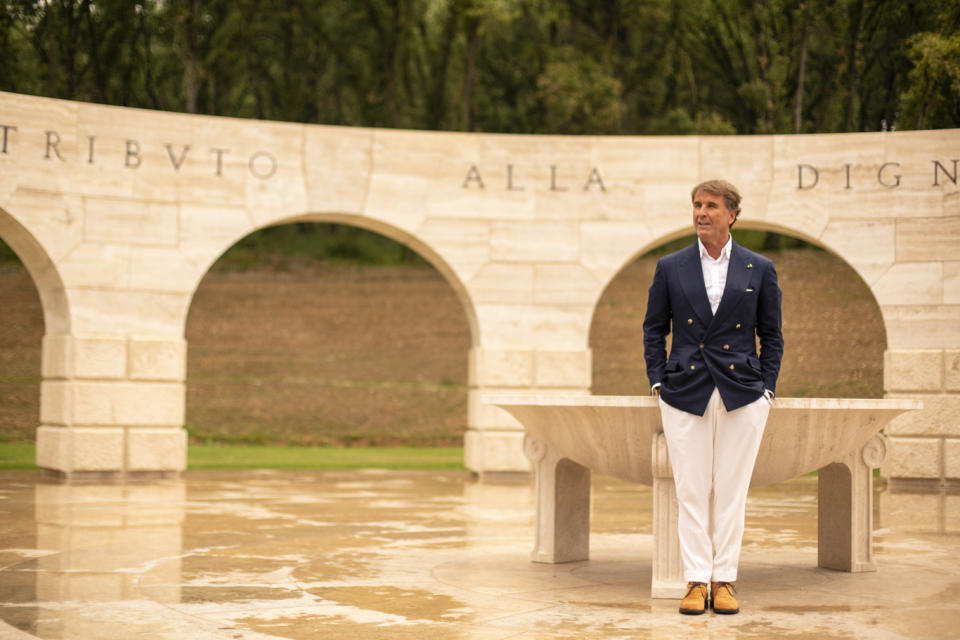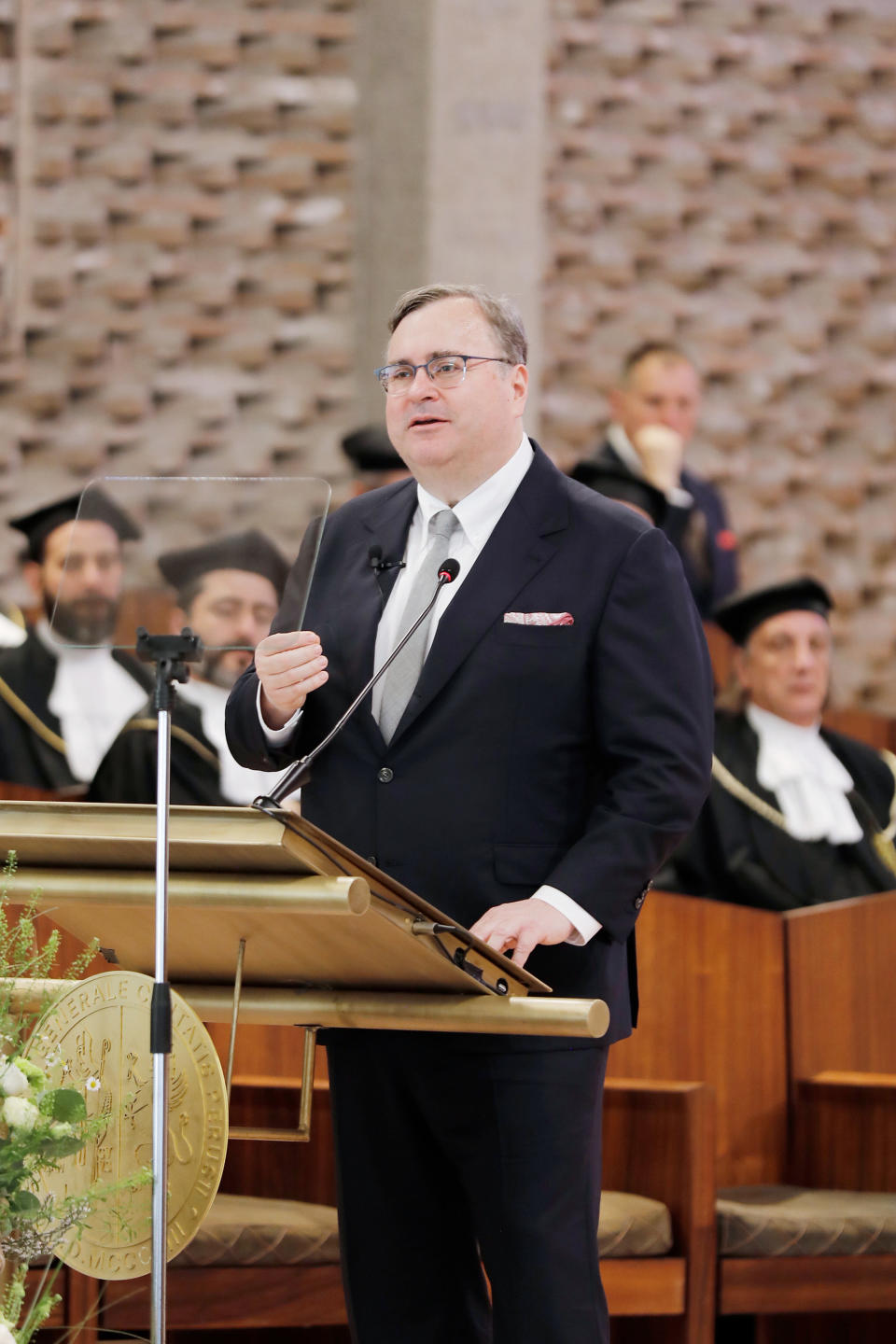Brunello Cucinelli, Reid Hoffman Discuss AI

MILAN — An Italian medieval hamlet has surprisingly become a meeting point for leaders of some of the most advanced innovations in technology.
Brunello Cucinelli for the second time hosted a three-day symposium in Solomeo, the ancient town he has restored and that houses his namesake company’s headquarters, which was focused on “exploring the relationship between ethics and artificial intelligence,” he explained.
More from WWD
Generative AI Video Production Start-up FancyTech Wins 2024 LVMH Innovation Award
PubMatic and Klarna Partner for Programmatic Advertising, Increasing Engagement Rates
The Universal Symposium on Soul and Economics, which ends Saturday, drew the likes of Reid Hoffman, cofounder and executive chairman of LinkedIn; Nicholas Thompson, chief executive officer of The Atlantic; Laurene Powell Jobs, American philanthropist, founder and president of Emerson Collective as well as the widow of Steve Jobs; James Manyika, senior vice president of Google Technology and Society; Fei-Fei Li, a scientist heading Stanford’s Human-Centered Artificial Intelligence Institute; artist Refik Anadol; Michael Evans, president of Alibaba; Arvind Krishna, CEO of IBM; African writer Uzodinma Iweala; Kevin Scott, chief technology officer of Microsoft; Pieter Van der Does, CEO of Adyen and CEO of Acument, and philanthropist Jacqueline Novogratz.
On Friday, the University of Perugia Rector Prof. Maurizio Oliviero bestowed Hoffman with an honorary Ph.D. in human sciences proposed by the Department of Philosophy, Social, Human and Education Sciences.
Hoffman, one of the founding fathers of generative artificial intelligence, was recognized for “his seminal contribution to the development of this new technological frontier of humanity and for having steered its development toward a vision of growth in human capabilities from the earliest times,” stated the university. “The doctoral college has seen in Hoffman a very authoritative scholar in the field of the relationship between technology and humanism, capable of bringing together in an interdisciplinary way subjects such as philosophy, sociology, anthropology, mathematics and neuroscience.”

Cucinelli praised Hoffman for being an “amiable person, with a wonderful dual soul of a scientist and a philosopher that shone through in the words he spoke today in his enchanting lecture.”
In an interview with WWD, Cucinelli reiterated his belief in AI, “which we should not fear,” but consider it “with interest and confidence, using it for the immense wealth of values it can provide humanity with.”
Turning to his beloved philosophers, who urged us to “always tackle the unprecedented challenges that await us with hope, with mind and heart,” he singled out the Persian Avicenna. “He thought that man is called upon to make use of his precious reason. Instinct is necessary, but it is the human intellect that helps us live more amiably and I would like the new generations to welcome the best of innovation as a blessing from Creation, nourishing their souls well.”
Cucinelli held the first edition of the symposium in Solomeo in May 2019 and reiterated that Hoffman and his peers are the “true Leonardo da Vinci of modern times.”
Cucinelli has not only built a business selling his luxury collections to Silicon Valley leaders, but also a network of personal relationships carefully nurtured over the course of several years, with the likes of Jeff Bezos and Salesforce founder Marc Benioff, centered around the common goal of “humanizing technology, sharing questions about eternity and leaving a mark on earth.” It all dates back to 2016 when Benioff and Instagram cofounder Kevin Systrom invited Cucinelli to a dinner in San Francisco, asking him to talk about his humanistic vision. In the two following years, Benioff asked Cucinelli to be a guest at Dreamforce, Salesforce’s annual tech conference in San Francisco.
Hoffman acknowledged that we are “living through an incredible technological transformation, one that we must shape and let shape us,” as humans are “toolmakers and tool users. And when those two elements — humanity and technology — come together, the result is not a cyborg, but a better human. We arrive at ourselves, amplified and improved through technology. […] We have an obligation to make the future better than the now.”

Here, Hoffman responds to WWD questions about why technology and AI in particular are often still cause for anxiety and concern.
“One thing I’ve noticed is that perceptions about AI vary quite a bit throughout the world. A survey that the market research firm Ipsos did in 2023 showed that on one side of the spectrum, you’ve got Indonesia, where 78 percent of those polled said they agreed with the statement that ‘products and services using artificial intelligence have more benefits than drawbacks.’ And then on the other end of the spectrum, you’ve got the U.S., where only 37 percent of those polled agree with that statement. Italy was in the middle, with 55 percent in agreement, and overall, the global average of the 31 countries that were polled was 54 percent in agreement.
“So in a lot of places, there appears to be a fair amount of optimism, and in others, not as much. I assume opinions are shaped in a lot of ways. In the U.S., for example, we’ve got a lot of pop culture that has depicted AI and robotics in adversarial ways. I’m sure news media coverage plays a role as well, along with lawmakers and people in the industry itself.
“But beyond how the narratives have been shaped, I also think it makes sense that people have concerns about this technology. Generally speaking, we humans want to exert control over our lives, and most people, I think, orient toward stability and familiarity. Uncertainty makes us uneasy. So here you’ve got this technology where a lot of people are saying, ‘It’s going to change everything and there’s nothing you can do about it.’ And that makes people concerned. It also underscores why I think it’s so important that developers are creating so many apps and systems that enable people to experiment with AI in hands-on, self-determining ways, so they can experience firsthand the ways these products can impact their lives. I think that’s crucial to developing AI inclusively, democratically, with a wide variety of stakeholders participating in the process.”
Best of WWD


